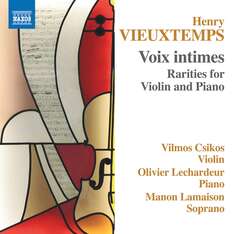Henri Vieuxtemps wurde 1820 geboren. Zum Jubiläum in 2020 wurden unveröffentlichte oder gar unbekannte Werke aus dem Besetz der Familie zugänglich gemacht. Die Fantasie für Stimme, Violine und Orchester gehört zu diesen Kompositionen. Der Gesang hat dabei die Aufgabe, wortlos Erinnerungen des Komponisten wachzurufen. Die Linien der Violine und der Stimme umranken sich dabei. Als Ersteinspielung ist dieses Stück in einer Klavierreduktion anstelle des Orchesters zu hören. Daneben sind Ma marche funèbre und Souvenir d’amitié ebenfalls erstmals aufgenommen zu erleben.
Drei junge Künstler haben sich diese Entdeckungen vorgenommen und legen ihre Ergebnisse vor. Die Sopranistin Manon Lamaison kommt nur in der am Ende erklingenden Fantasie zum Einsatz. Solide singend bewältigt sie ihren wortlosen Beitrag. Man kann den Eindruck gewinnen, dass die Wortlosigkeit auch ihr sängerisches Gestaltungsvermögen eingeengt hat.
Geiger Vilmos Csikos und Pianist Olivier Lechardeur sind durchgehend am Geschehen beteiligt. Csikos legt positiverweise die Musik eher musikalisch als virtuos an, wobei ihm auch die strahlende solistische Aura nicht schwerfällt. Doch legen auch Werktitel wie Elégie und Romanze ein solches Vorgehen nahe. Manche gestalterische Nuance hätte man sich noch ausgeformter im Sinne der musikalischen Aussage und sicherer in der Intonation vorstellen können, um einen einheitlichen Genuss zu ermöglichen.
Lechardeur findet als sicherer und zuverlässiger Begleiter seinen Platz im Duo. So bleibt insgesamt der Eindruck, dass diese Raritäten des Repertoires hier passabel gezeigt werden.
Henri Vieuxtemps was born in 1820. To mark the anniversary in 2020, unpublished or even unknown works from the family’s repertoire have been made available. The Fantasia for voice, violin and orchestra is one of these compositions. The voice has the task of wordlessly evoking memories of the composer. The lines of the violin and the voice entwine. This piece can be heard for the first time in a piano reduction instead of the orchestra. Ma marche funèbre and Souvenir d’amitié are also being recorded for the first time.
Three young artists have taken on these discoveries and present their results. The soprano Manon Lamaison only appears in the fantasy at the end. Singing solidly, she masters her wordless contribution. One can get the impression that the lack of words has also restricted her vocal creativity.
Violinist Vilmos Csikos and pianist Olivier Lechardeur are involved throughout. Csikos positively presents the music in a musical rather than virtuoso manner, whereby the radiant soloistic aura is not difficult for him. However, work titles such as Elegy and Romance also suggest such an approach. One could have imagined some of the creative nuances to be even more fully formed in the sense of the musical statement and more secure in the intonation in order to enable a uniform enjoyment.
Lechardeur finds his place in the duo as a secure and reliable accompanist. Overall, the impression remains that these rarities of the repertoire are presented here in a passable manner.




















